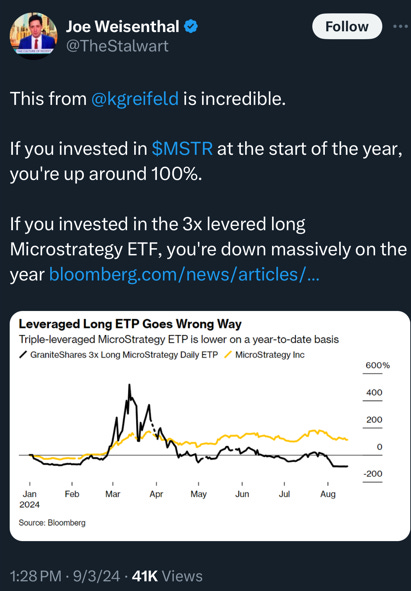Why the Rise of Leveraged ETFs is Tempting — and Why Most Investors Should Steer Clear
Stop being in such a hurry...
Leverage is the most efficient way to maximize your balance sheet and the easiest way to lose everything. - Morgan Housel, ‘Same as Ever’
When the stock market is thriving, there’s a tendency for many investors to chase the highest returns possible. Index funds like the S&P 500 start to feel boring, especially when others seem to be making money quickly.
Enter leveraged ETFs - investments designed to amplify returns, often promising double or even triple the daily performance of an underlying index or stock.
For example, a 2x leveraged ETF aims to provide twice the daily return, while a 3x ETF aims for triple. This is achieved by using financial derivatives like futures contracts and swaps.
However, these funds are designed for daily returns. Over time, the compounding effects of daily price fluctuations can result in returns that diverge significantly from the index they track.
Take TQQQ - a leveraged ETF that triples the daily return of the Nasdaq-100 index. In 2019, 2020, and 2021, this fund generated impressive returns, over 80% annually.
But then 2022 happened. While the Nasdaq-100 (tracked by QQQ) fell by 33%, TQQQ fell by 79%. This illustrates the dangers of leverage in volatile markets.
Any Michael Saylor fans around here? The stock MicroStrategy is having a great year, up around 77% year to date.
The same can’t be said for the 3x Levered Long MSTR ETF:
Consider my personal experience buying UCO, a leveraged ETF that tracks the price of crude oil. In May 2020, around the time oil prices went negative, I thought I was the man buying into this fund.
While I made a little money off this trade, I eventually sold out because I had no idea what I was doing. Today, UCO is still down 77% over a 5-year period.
Leveraged products like these aren’t designed for long-term investors.
Howard Marks, in his 2008 memo during the chaos of the GFC, put it simply:
Volatility + Leverage = Dynamite
Leveraged ETFs and margin trading introduce significantly more risk. Leverage increases potential gains, but it also amplifies losses.
Margin trading can be equally dangerous. Borrowing money to invest may increase returns in rising markets, but if the market turns, losses are magnified. Margin calls force investors to sell positions at a loss to cover loans, locking in even more damage.
This stuff isn’t going away. A new generation of single-stock ETFs have also entered the market:
These products appeal to traders seeking excitement and volatility, but they often lead to more losses than gains over time. Without constant volatility, these funds struggle, and providers may shut them down.
Not to mention fees…
Leveraged ETFs typically come with higher expense ratios due to their complex structure, which these investment companies love.
They finally don't have to compete with Vanguard or Blackrock, known for their minimal fees.
According to Morningstar,
The average investor paid a 1.07% annual fee for single-stock ETFs at the end of March 2024. That’s nearly 3 times what they paid for the average fund across the overall US market.
These higher costs can eat into returns, particularly over longer holding periods.
Additionally, the returns from these products can diverge significantly from their stated goals if held for more than one day. The constant rebalancing and effects of compounding mean that these funds often fail to deliver their promised results over time.
Remember that the best portfolio for you is the one that you can actually live with and stay consistent with over decades.
You need to be able to forego short term returns and have a long term strategy. If you want to speculate with a portion of your portfolio, be my guest.
But for many people, the goal isn’t to make a killing in the stock market; it’s to ensure you don’t get killed. It’s not about hitting a home run with every trade but about consistently making solid decisions that accumulate over time.
You may be able to succeed using these investments for a few months or even a few years, but it’s not sustainable over decades.
Focus on a handful of key decisions — saving early and often, keeping your expenses low, being tax efficient, and investing in income producing assets.
Become an investor, not a speculator.
It’s not hard to make money in the stock market.
What is hard is avoiding the temptation to over speculate, to use leverage, to become so concentrated in one company or fund, or trying to time the market.
Disclosure: This material is for general information only and is not intended to provide specific advice or recommendations for any individual. All performance referenced is historical and is no guarantee of future results.
All rates disclosed above are not 100% accurate as you need to consult a professional.
All investing includes risks, including fluctuating prices and loss of principal.


